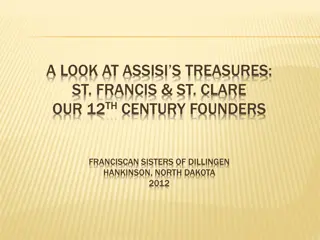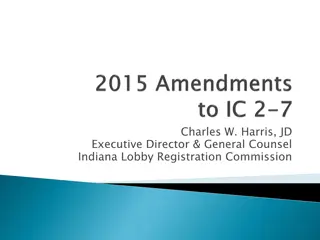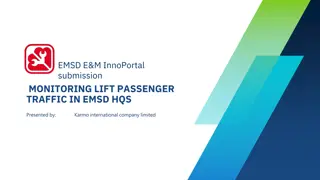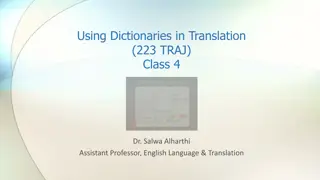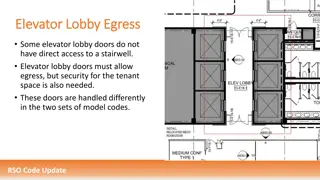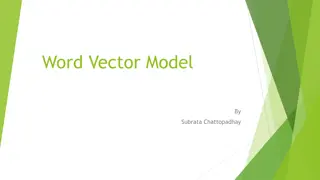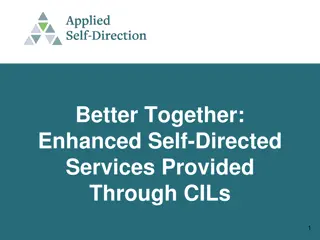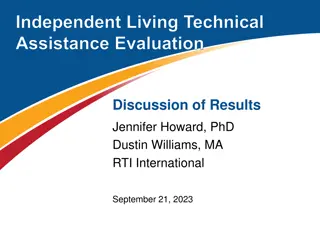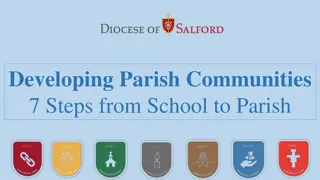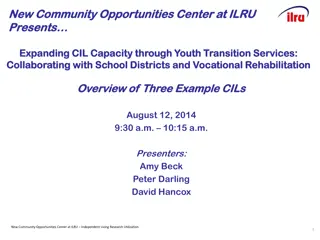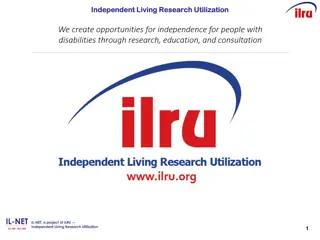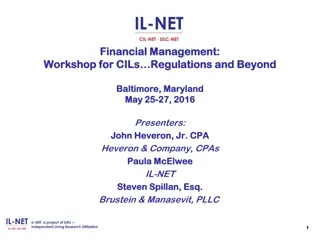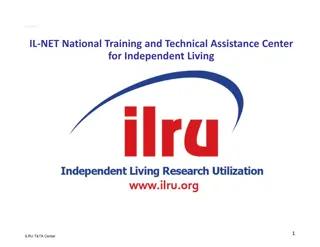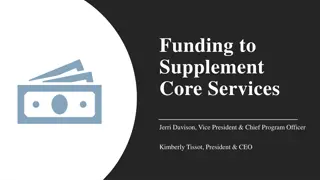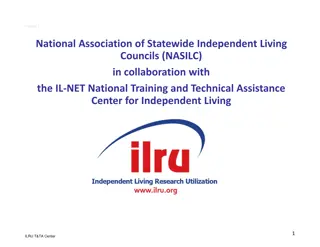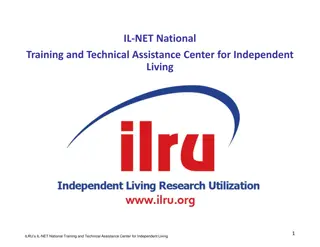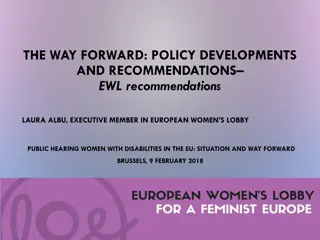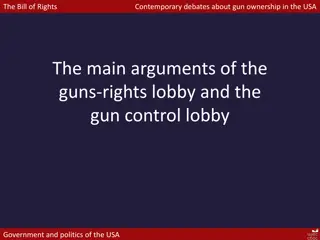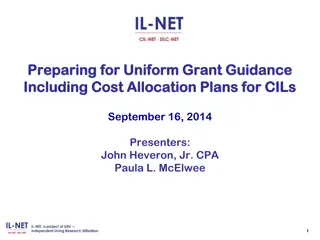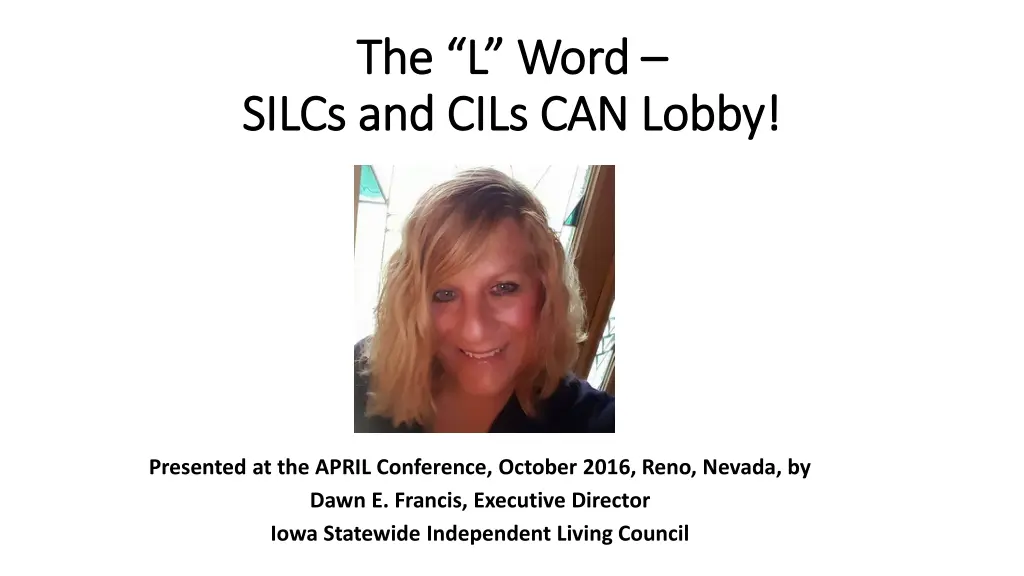
Understanding Lobbying Regulations and Definitions
Learn about federal and state regulations related to lobbying, including the IRS definition of lobbying, types of lobbying (grasroots and direct), and important considerations when engaging in lobbying activities. Discover the nuances between educating and lobbying, and how to navigate lobbying laws effectively.
Download Presentation

Please find below an Image/Link to download the presentation.
The content on the website is provided AS IS for your information and personal use only. It may not be sold, licensed, or shared on other websites without obtaining consent from the author. If you encounter any issues during the download, it is possible that the publisher has removed the file from their server.
You are allowed to download the files provided on this website for personal or commercial use, subject to the condition that they are used lawfully. All files are the property of their respective owners.
The content on the website is provided AS IS for your information and personal use only. It may not be sold, licensed, or shared on other websites without obtaining consent from the author.
E N D
Presentation Transcript
The L Word The L Word SILCs and CILs CAN Lobby! SILCs and CILs CAN Lobby! Presented at the APRIL Conference, October 2016, Reno, Nevada, by Dawn E. Francis, Executive Director Iowa Statewide Independent Living Council
Disclaimers There are both federal and state regulations that pertain to lobbying. Please keep in mind that state lobbying regulations vary from state to state. It is important that you research the lobbying laws in your state before trying to implement policies and procedures for lobbying. Many state universities do have law departments and people who specialize in lobbying laws that would be willing to assist you in understanding the laws in your state, and helping you to develop policies for how you can lobby as a non-profit.
Agenda I. Semantics Educate Versus Lobby II. What Is the Federal IRS Definition of Lobbying III. When There Is No Other Way BUT To Lobby Iowa SILC Policy and Procedure
I. I. Semantics Semantics Educate Versus Lobby Educate Versus Lobby Many people working in non-profit organizations usually know about semantics that being the ability to put into acceptable words what you are doing when you talk to a Legislator or policy maker. Or when you are putting language in your State Plan for Independent Living (SPIL) about the activities you will do to advocate for the rights of people with disabilities. Certain language is acceptable to our federal funders, and the L word, or Lobby , is NOT one of the words they want us to use. We often use the word educate , and say we are educating a Legislator about a policy or an issue. We feel safer to use the word educate , but just because you say that you are educating a Legislator, that does NOT mean that you are not actually, in fact, LOBBYING. In order to truly educate Legislators, it is imperative that we understand what the federal IRS definition of lobbing is.
I. Federal IRS Definition of Lobbying I. Federal IRS Definition of Lobbying The federal Internal Revenue Service (IRS) regulations define TWO types of Lobbying: Grassroots Lobbying And Direct Lobbying
I. Federal IRS Definition of Lobbying I. Federal IRS Definition of Lobbying Grassroots Lobbying is defined as any attempt to influence local, state, or federal legislation by attempting to influence public opinion and get the public to act. To be considered grassroots lobbying, an activity must meet both of the following criteria: Express a view for or against a specific piece of legislation; and Encourage the public to take action regarding that legislation. A communication must do both of these things to be considered grassroots lobbying.
I. Federal IRS Definition of Lobbying I. Federal IRS Definition of Lobbying Direct Lobbying is defined as any attempt to influence local, state, or federal legislation by contacting any member of a legislature, legislative staff or government employee to persuade him or her to propose, support, oppose, change, or otherwise influence legislation. Examples of direct lobbying are: Writing to state or federal legislators Calling legislators Meeting with legislators in person; and Presenting testimony to a legislative committee or subcommittee
I. Federal IRS Definition of Lobbying I. Federal IRS Definition of Lobbying The IRS further clarifies, under this election, what activities are allowed and not subject to lobbying limits. Those activities are: Contacts with Executive Branch employees or legislators in support of or opposition to proposed regulations are not considered lobbying. For example, if the organization is trying to get a regulation changed, you may contact members of the Executive Branch as well as legislators to urge them to support your position on the regulation. This is not considered lobbying. Lobbying by volunteers is only considered a lobbying expenditure to the extent that the organization incurs expenses associated with volunteers lobbying activities.
I. Federal IRS Definition of Lobbying I. Federal IRS Definition of Lobbying The IRS further clarifies, under this election, what activities are allowed and not subject to lobbying limits. Those activities are: An organization s communication to its members on legislation, even if it takes a position on the legislation, is not lobbying as long as the organization does not ask its members to take action. An organization s response to written requests from a legislative body for technical advice on pending legislation is not considered lobbying.
I. Federal IRS Definition of Lobbying I. Federal IRS Definition of Lobbying The IRS regulations allow non-profits to submit a federal Form 5768, which allows non-profits to make expenditures to influence legislation under specific guidelines and limits. What this means is that the non-profit organization is allowed to conduct lobbying activities utilizing what is called the Expenditure Test . The IRS provides a special formula for non-profit organizations to determine their allowable lobbying expenditures. This means the non-profit is allowed to spend up to 20% of its first $500,000 of total yearly expenditures on lobbying activities. However, no federal or state funds or resources can be used to lobby. Additionally, only 25% of the total allowable lobbying funding can be spent on Grassroots Lobbying .
I. Federal IRS Definition of Lobbying I. Federal IRS Definition of Lobbying The IRS further clarifies, under this election, what activities are allowed and not subject to lobbying limits. Those activities are: Self-defense activities, such as lobbying legislators (not the general public) about matters that may impact the organization s existence, powers, tax-exempt status, and other such matters, are not considered lobbying. Making available the results of nonpartisan analysis, study, or research on a legislative issue that presents a sufficiently full and fair exposition of the pertinent facts to enable the audience to form an independent opinion, is not considered a lobbying activity. Analyses are not required to be neutral or objective nature to qualify for this exclusion. This exclusion is available to research and analyses that take direct positions on legislation, as long as the facts are fully and fairly presented, the material is generally available, and the report does not include a direct call to the reader to contact legislators. Efforts are not considered to be grassroots lobbying if an organization urges the public, through the media or other means, to vote for or against a ballot initiative or referendum. This is considered direct lobbying because the public becomes the legislator in this situation.
III. When There Is No Other Way BUT To Lobby III. When There Is No Other Way BUT To Lobby Iowa SILC Policy and Procedure Iowa SILC Policy and Procedure The Iowa SILC has put into place carefully crafted language in our ByLaws and Policies and Procedures to clearly state that as a non-profit entity, we WILL lobby when needed. We also lay out clear policies and procedures for how we will do that and ensure we are following all laws and not using any federal or state funding on lobbying activities.
III. When There Is No Other Way BUT To Lobby III. When There Is No Other Way BUT To Lobby Iowa SILC Policy and Procedure Iowa SILC Policy and Procedure There are several ways a non-profit can conduct lobbying activities within the legal guidelines: 1. Conduct lobbying activities within the IRS guidelines, using non-federal and state funds, within the limits allowed, and tracking those expenses. 2. Conduct lobbying activities ONLY with the use of volunteers, without any organizational money being expended.
III. When There Is No Other Way BUT To Lobby III. When There Is No Other Way BUT To Lobby Iowa SILC Policy and Procedure Iowa SILC Policy and Procedure Conducting lobbying activities within the IRS guidelines, using non-federal and state funds, within the limits allowed, and tracking those expenses, will require the non-profit to have great accounting software, and staff who are willing to document activities. The non-profit must have funds other than state and federal funds that can be used for lobbying activities. The non-profit needs to complete and submit federal form f5768, Election/Revocation of Election by an Eligible Section 501(c)(3) Organization To Make Expenditures To Influence Legislation (Under Section 501(h) of the Internal Revenue Code).
III. When There Is No Other Way BUT To Lobby III. When There Is No Other Way BUT To Lobby Iowa SILC Policy and Procedure Iowa SILC Policy and Procedure We covered the guidelines previously for how much you can spend on lobbying activities: A non-profit organization is allowed to conduct lobbying activities utilizing what is called the Expenditure Test . The IRS provides a special formula for non-profit organizations to determine their allowable lobbying expenditures. This means the non-profit is allowed to spend up to 20% of its first $500,000 of total yearly expenditures on lobbying activities. However, no federal or state funds or resources can be used to lobby. Additionally, only 25% of the total allowable lobbying funding can be spent on Grassroots Lobbying .
III. When There Is No Other Way BUT To Lobby III. When There Is No Other Way BUT To Lobby Iowa SILC Policy and Procedure Iowa SILC Policy and Procedure So, if you are willing to do all the paperwork and tracking, this is one way you can lobby. However, the amount of work to lobby using unrestricted funds just seemed like too much work to me so the Iowa SILC chose the second option.
III. When There Is No Other Way BUT To Lobby III. When There Is No Other Way BUT To Lobby Iowa SILC Policy and Procedure Iowa SILC Policy and Procedure Conducting lobbying activities ONLY with the use of volunteers, without any organizational money being expended, still requires some documentation, but not nearly as much as the first option. It also requires that the non-profit have an Executive Director that is willing to volunteer and donate their personal time when lobbying needs to occur. So let s get in to the language that the Iowa SILC used in its ByLaws and Policies and Procedures to make this work. It should also be noted that we had assistance and guidance in the development of these policies and procedures from several professors at the University of Iowa School of Law.
III. When There Is No Other Way BUT To Lobby III. When There Is No Other Way BUT To Lobby Iowa SILC Policy and Procedure Iowa SILC Policy and Procedure Here is a very simplified explanation of how the Iowa SILC is doing lobbying, before we get into the actual language we use: 1. The SILC ED volunteers her time whenever lobbying is needed. 2. The SILC ED completes a SILC Volunteer Timesheet on the days she volunteers to lobby. 3. The Volunteer Timesheet lists the date, times worked at the SILC office, and times worked lobbying. Only the hours worked in the SILC office go on the SILC ED work timesheet and work Personal Activity Report (PAR).
III. When There Is No Other Way BUT To Lobby III. When There Is No Other Way BUT To Lobby Iowa SILC Policy and Procedure Iowa SILC Policy and Procedure Dawn E. Francis SILC Volunteer Hours for Lobbying and Fundraising February 2016 Date SILC Work Hours Lobbying Hours On My Own Time-Not Paid Fundraising Hours On My Own Personal Time- Not Paid N/A 2/18/16 8:30 am -12:30 pm = 4.00 hrs. 1:30 pm 11:30 pm = 10.00 hrs. Total SILC Hours: 14.00 hrs. 12:30 pm 1:00 pm = .50 hrs. Meeting with Senator Bob Dvorsky on the need for additional funding for CILs. Hours logged on SILC Timesheet and SILC PARs: 14.00 Total Hours for 2/18/15: 14.50
III. When There Is No Other Way BUT To Lobby III. When There Is No Other Way BUT To Lobby Iowa SILC Policy and Procedure Iowa SILC Policy and Procedure SILC ByLaws Language: Section 1.3. Political Activity. The Council shall not use any organizational funds in the furtherance of, nor engage in, any political activity for or against any candidate for public office. No portion of its funds shall be used for lobbying or in any way attempting to influence legislation except as provided by law. The Council is a 501(c)3 non-profit, incorporated under the name Iowa Statewide Independent Living Council. As such, the Council may engage in lobbying as a non-profit in accordance with all state and federal laws for non-profit lobbying, as long as no federal or state funding or resources are used in this effort. The Council will follow the policy and procedure for SILC Non-Profit Entity lobbying as outlined in the Iowa SILC Employee and Council Member Policy and Procedure Manual.
III. When There Is No Other Way BUT To Lobby III. When There Is No Other Way BUT To Lobby Iowa SILC Policy and Procedure Iowa SILC Policy and Procedure SILC ByLaws Language: ARTICLE IX EXECUTIVE DIRECTOR The Executive Director shall have the following duties and responsibilities: G. To ensure that any lobbying or fundraising activities conducted by the Executive Director or Council Members does not use any federal or state funding or resources of the Council, that all applicable federal and state lobbying regulations are being adhered to. The Council empowers the Executive Director to use his/her best judgment in following the laws and in selecting issues to address that are pertinent to the independence of people with disabilities. At no time will the Council or Executive Director lobby on behalf of a candidate for political office.
III. When There Is No Other Way BUT To Lobby III. When There Is No Other Way BUT To Lobby Iowa SILC Policy and Procedure Iowa SILC Policy and Procedure SILC ByLaws Language: Section 11.9. Lobbying. and mandated SILC Entity, and the SILC Non-Profit Entity. The Council is an established 501(c)3, and as a non-profit may lobby as long as no federal or state funds or resources are used in conducting the lobbying, and as long as all federal and state lobbying regulations are adhered to. Unrestricted donation funds may be used to conduct lobbying activities if the Council votes to approve the use of those funds for that purpose. Any funds used for lobbying activities must be reported on Schedule C of the federal 990 Form. The Council will only lobby on issues specific to the independence of people with disabilities, and will not conduct any lobbying in support of any political candidate. The Council and Executive Director will follow the Lobbying Policy as outlined in the Iowa SILC Employee and Council Member Policy and Procedure Manual. The Council is comprised of two entities: the federally funded
III. When There Is No Other Way BUT To Lobby III. When There Is No Other Way BUT To Lobby Iowa SILC Policy and Procedure Iowa SILC Policy and Procedure SILC Policy & Procedures Language: 10.4 Role and Responsibility of the Executive Director C. Demonstrates Good Verbal and Written Communication Skills 1. All materials, including reports, correspondence, e-mails, and public presentations, are clearly articulated and reflect positively on the professional standards of the SILC. The Council charges the Executive Director with ensuring that any lobbying or fundraising activities conducted by the Executive Director or Council Members on behalf of the SILC Non-Profit Entity do not use any federal or state funding or resources of the SILC, and that all applicable federal and state lobbying regulations are being adhered to. If the SILC ED chooses to volunteer her/his time to lobby on behalf of the SILC Non-Profit Entity, the Council empowers the Executive Director to use his/her best judgment in following the laws and in selecting issues to address that are pertinent to the independence of people with disabilities which fit the Council s mission. At no time will the Council or Executive Director lobby on behalf of a candidate for political office. The SILC ED will compile a brief report, on her/his own time, of all lobbying and fundraising activities engaged in since the last SILC Non-Profit Entity Council meeting, and will report on this at each SILC Non-Profit Entity Council Meeting. The SILC Non-Profit Entity Council Meetings will be held immediately following the adjournment of the regular SILC Council Meetings. All sign-ons of the SILC that the Executive Director does for letters to legislators and/or policy makers on disability issues/legislation, or a letter of support for the grant application of a partner organization, shall be presented to the Council at the next SILC Non Profit Entity Council meeting for endorsement. The Executive Director will follow the Lobbying Policy and Fundraising Policy outlined later in this Policy and Procedure Manual.
III. When There Is No Other Way BUT To Lobby III. When There Is No Other Way BUT To Lobby Iowa SILC Policy and Procedure Iowa SILC Policy and Procedure SILC Policy & Procedures Language: 12.3 Lobbying Policy The Iowa SILC is comprised of two entities: the federally funded and mandated SILC Entity, and the SILC Non-Profit Entity. The Iowa SILC is incorporated as a 501(c)3 non-profit entity, and as such the SILC Non-Profit Entity may conduct some lobbying activity as long as it is in compliance with Iowa Code and federal law for non-profit lobbying, and as long as no federal or state funds or resources are used in the lobbying effort. Examples of resources tied to federal or state funding are SILC computers, office Internet connection, copy machine, phone, paper/envelopes, and SILC ED salary/benefits/mileage. None of these resources will be used by the SILC Non-Profit Entity in any lobbying activities. The SILC Non-Profit Entity is allowed to use unrestricted donation funds to lobby. However, in most situations lobbying will be conducted by volunteers and no SILC Non-Profit Entity unrestricted donation funds will be used. In the event that funding is needed for a specific lobbying activity, the unrestricted donation funds of the SILC Non-Profit Entity may be used for lobbying activities if the voting members of the Council approve the use of those funds for that purpose for a specific activity. The SILC ED will ensure that any Council approved use of unrestricted donation funds for lobbying activities will be within the allowable state and federal guidelines for non-profit lobbying.
III. When There Is No Other Way BUT To Lobby III. When There Is No Other Way BUT To Lobby Iowa SILC Policy and Procedure Iowa SILC Policy and Procedure SILC Policy & Procedures Language: 12.3 Lobbying Policy (Continued) The SILC has, with the submission of federal Form 5768, made the election to make expenditures to influence legislation as the SILC Non-Profit Entity. What this means is that the SILC Non-Profit Entity is allowed to conduct lobbying activities utilizing what is called the Expenditure Test . The IRS provides a special formula for non-profit organizations to determine their allowable lobbying expenditures. This means the SILC non-profit entity is allowed to spend up to 20% of its first $500,000 of total yearly expenditures on lobbying activities. However, no federal or state funds or resources can be used to lobby. Additionally, only 25% of the total allowable lobbying funding can be spent on Grassroots Lobbying .
III. When There Is No Other Way BUT To Lobby III. When There Is No Other Way BUT To Lobby Iowa SILC Policy and Procedure Iowa SILC Policy and Procedure SILC Policy & Procedures Language: 12.3 Lobbying Policy (Continued) Grassroots Lobbying is defined as any attempt to influence local, state, or federal legislation by attempting to influence public opinion and get the public to act. To be considered grassroots lobbying, an activity must meet both of the following criteria: Express a view for or against a specific piece of legislation; and Encourage the public to take action regarding that legislation. A communication must do both of these things to be considered grassroots lobbying.
III. When There Is No Other Way BUT To Lobby III. When There Is No Other Way BUT To Lobby Iowa SILC Policy and Procedure Iowa SILC Policy and Procedure SILC Policy & Procedures Language: 12.3 Lobbying Policy (Continued) Direct Lobbying is defined as any attempt to influence local, state, or federal legislation by contacting any member of a legislature, legislative staff or government employee to persuade him or her to propose, support, oppose, change, or otherwise influence legislation. Examples of direct lobbying are: Writing to state or federal legislators Calling legislators Meeting with legislators in person; and Presenting testimony to a legislative committee or subcommittee
III. When There Is No Other Way BUT To Lobby III. When There Is No Other Way BUT To Lobby Iowa SILC Policy and Procedure Iowa SILC Policy and Procedure SILC Policy & Procedures Language: 12.3 Lobbying Policy (Continued) The SILC Non-Profit Entity will conduct lobbying activities with volunteers (see second bullet above) who do so on their own time and who are not reimbursed by the SILC for their expenditures, if they have any, to do this activity. If the SILC ED chooses to volunteer her/his time to lobby on behalf of the SILC Non-Profit Entity, she/he may do so as long as she/he does not use any federal or state funds or resources to do so. The SILC ED will set up a separate e-mail address for the SILC Non-Profit Entity, not tied to the e-mail system that the SILC currently uses. That separate e-mail system may be used by the SILC ED, on her/his own time and from a computer other than the SILC office computers, and not using the SILC office Internet connection, to send out e- mails pertaining to disability legislation, policy, or other issues that are either direct lobbying (to legislators, the Governor, etc.), or grassroots lobbying (to the general public, consumers, partners).
III. When There Is No Other Way BUT To Lobby III. When There Is No Other Way BUT To Lobby Iowa SILC Policy and Procedure Iowa SILC Policy and Procedure SILC Policy & Procedures Language: 12.3 Lobbying Policy (Continued) To ensure the SILC Non-Profit Entity is in full compliance with the federal regulations, the SILC ED will not forward any e-mails from the SILC office e- mail address that would be considered Grassroots Lobbying as defined above. Even though the SILC ED is just forwarding these types of e-mails from others and is not herself/himself directly advocating on the issue, it could be perceived as being direct lobbying. Specifically, these would be e-mails that both take a position on a legislative issue and urge action on the issue. The SILC ED may forward these types of e-mails from the SILC Non-Profit Entity e- mail on her/his own time, from a computer other than the SILC office computers, and from an Internet service other than the SILC office Internet service.
III. When There Is No Other Way BUT To Lobby III. When There Is No Other Way BUT To Lobby Iowa SILC Policy and Procedure Iowa SILC Policy and Procedure SILC Policy & Procedures Language: 12.3 Lobbying Policy (Continued) To ensure the SILC Non-Profit Entity is in full compliance with the federal regulations, the SILC ED will not forward any e-mails from the SILC office e- mail address that would be considered Grassroots Lobbying as defined above. Even though the SILC ED is just forwarding these types of e-mails from others and is not herself/himself directly advocating on the issue, it could be perceived as being direct lobbying. Specifically, these would be e-mails that both take a position on a legislative issue and urge action on the issue. The SILC ED may forward these types of e-mails from the SILC Non-Profit Entity e- mail on her/his own time, from a computer other than the SILC office computers, and from an Internet service other than the SILC office Internet service.
III. When There Is No Other Way BUT To Lobby III. When There Is No Other Way BUT To Lobby Iowa SILC Policy and Procedure Iowa SILC Policy and Procedure SILC Policy & Procedures Language: 12.3 Lobbying Policy (Continued) If the SILC ED chooses to volunteer her/his time to lobby on behalf of the SILC Non- Profit Entity, she/he will ensure that no federal or state funding or resources are used for this activity, including no paid time from the SILC for the SILC ED to conduct any lobbying activities as the SILC ED salary is paid with federal funds. The SILC ED may send out both Grassroots Lobbying and Direct Lobbying e-mails from a separate e-mail that is set up for the SILC Non-Profit Entity. She/he must send out these e-mails from a computer other than the SILC office computers, using an Internet connection other than the SILC office Internet connection, and on her/his own time. The SILC ED may also meet with legislators and other officials to lobby on a specific issue on behalf of the SILC Non-Profit Entity, but must do so on his/her own time, and no federal or state funds or resources will be used.
III. When There Is No Other Way BUT To Lobby III. When There Is No Other Way BUT To Lobby Iowa SILC Policy and Procedure Iowa SILC Policy and Procedure SILC Policy & Procedures Language: 12.3 Lobbying Policy (Continued) In order to ensure transparency, the SILC ED will maintain a SILC Non-Profit Entity Volunteer Log of all hours and times when she/he, on her/his own time, voluntarily conducts lobbying activities for the SILC Non-Profit Entity. This will include the date, time frame (i.e., 10:00 am to 12:00 pm), issue being addressed, and description of lobbying (i.e., e-mail sent, meeting with Legislator X, etc.). If the SILC ED needs to take off work during a regular work day to conduct lobbying activities, she/he will also log the specific hours of SILC work (i.e., 9 am-10 am and 12 pm-7 pm) along with the information specified above for documentation of lobbying activities. The SILC ED will keep this SILC Non-Profit Entity Volunteer Log on a computer that is not tied to the SILC federal or state funding or resources to have documentation in the event that any question would arise as to whether the SILC Non-Profit Entity and the SILC ED are conducting lobbying activities using federal or state funding or resources.
III. When There Is No Other Way BUT To Lobby III. When There Is No Other Way BUT To Lobby Iowa SILC Policy and Procedure Iowa SILC Policy and Procedure SILC Policy & Procedures Language: 12.3 Lobbying Policy (Continued) The Council charges the Executive Director with ensuring that any lobbying activities conducted by the Executive Director or Council Members on behalf of the SILC Non-Profit Entity do not use any federal or state funding or resources of the Council, and that all applicable federal and state lobbying regulations are being adhered to. If the SILC ED chooses to volunteer her/his time to lobby on behalf of the SILC Non-Profit Entity, the Council empowers the Executive Director to use her/his best judgment in following the laws and in selecting issues to address that are pertinent to the independence of people with disabilities which fit the Council s mission. At no time will the Council or Executive Director lobby on behalf of a candidate for political office. The SILC ED will compile a brief report, on her/his own time, of all lobbying activities engaged in on behalf of the SILC Non- Profit Entity since the last meeting, and will report on this at each SILC Non-Profit Entity Council Meeting. The SILC Non-Profit Entity Council Meeting will be conducted immediately after the adjournment of the regular SILC Council Meeting. All sign-ons of the SILC that the Executive Director does for letters to legislators and/or policy makers on disability issues/legislation, or a letter of support for the grant application of a partner organization, on behalf of the SILC Non-Profit Entity, shall be presented to the Council at the next SILC Non-Profit Entity meeting for endorsement. The Executive Director will follow the Lobbying policy outlined in this Policy and Procedure Manual.
III. When There Is No Other Way BUT To Lobby III. When There Is No Other Way BUT To Lobby Iowa SILC Policy and Procedure Iowa SILC Policy and Procedure SILC Policy & Procedures Language: 12.3 Lobbying Policy (Continued) The SILC will comply with all state and federal laws regarding limitation and reporting of lobbying activities. This includes Title 31, section 1352 of the U.S. Code and Iowa Code Chapter 68B, and completing Schedule C and other pertinent sections of the IRS 990 form annually. The SILC will not spend any federal or state funds for the purpose of influencing an officer or employee of any agency or a member of Congress or the state legislature in connection with any grant or cooperative agreement. If any funds other than state or federal funds (meaning unrestricted donation funds) have been paid for the purpose of influencing any officer or employee of any agency or member of Congress or the state legislature, the SILC will report this expenditure on a federal Lobby Registration Financial Summary Report form (LR3) and an Iowa General Assembly Lobbyist Report.
THANK YOU! QUESTIONS? THANK YOU! QUESTIONS? Copies of this PowerPoint presentation on The L Word - SILCs and CILs CAN Lobby will be posted on the APRIL website after the conference. For more information, please contact: Dawn Francis Executive Director Iowa Statewide Independent Living Council (SILC) dawn@iowasilc.org 515-282-0275

